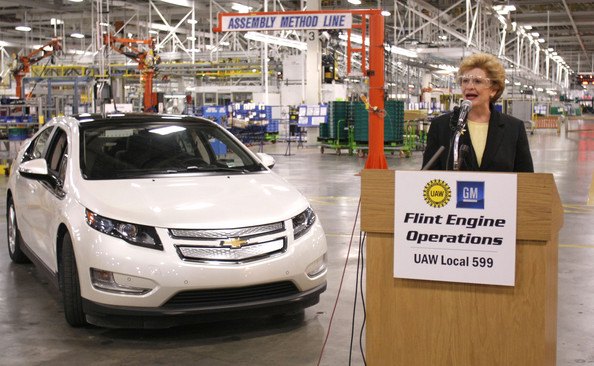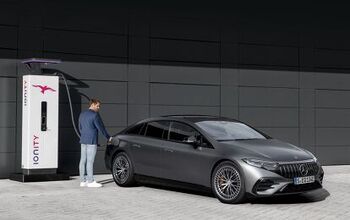Stabenow Introduces Plug-In Tax Credit Extension
Senator Debbie Stabenow has introduced S. 3715, known as the Charging America Forward Act, which would extend tax credits for plug-in vehicles until 2014 and “front load” the credits, to create a dealership-level discount, among other provisions. Though inspired by President Obama’s call to put a million plug-in vehicles on the road by 2015, Stabenow’s website plays up a single, all-important angle to the bill
Michigan is already a leader in emerging hi-tech battery and electric car production. Other countries are acting to develop their own advanced vehicle markets because they realize the tremendous economic potential this new technology represents. These initiatives will allow Michigan innovators to continue to out-compete the world and create new jobs here
Though the full text of the bill hasn’t hit Govtrack yet, the DetN reports that it’s chock full of plug-in subsidies, so it seems that Stabenow’s proposa is considerably more dramatic than the recent plug-in credit extension introduced by Rep Sander Levin. And that’s not necessarily a good thing…
For starters, we assumed that efforts to front-load plug-in tax credits were dead in the water before Stabenow resurrected them. After all, the only real beneficiaries of front-loaded EV credits (other than qualifying automakers) are wealthy EV buyers whose tax credit might be eaten up by the Alternative Minimum Tax. We assumed that tax breaks for the wealthy might not fly within the Democratic Party, but then, any form of EV stimulus amounts to a tax break for the wealthy as nobody is buying EVs as a purely financial choice.
Additionally, the DetN reports that Stabenow’s bill would
authorize the U.S. Energy Department to award another $2 billion in grants “for the manufacturing of advanced batteries and components, and provide facility funding awards” for vehicle batteries, hybrid electrical systems and components…
It would also extend and expand a tax credit for purchasing medium or heavy-duty plug-in hybrid trucks until 2014. The tax credit would be worth between $15,000 and $100,000, depending on the truck’s size.
The grants would be another round of DOE giveaways to plug-in efforts like DC Bus Capacitor manufacturing by KEMET, and the still-mysterious “Construction of U.S. manufacturing capabilities to produce the second-generation GM global rear-wheel electric drive system.” Not to be confused with retooling loans, these grants help some of the less-sexy suppliers, although they keep the fledgling EV industry at the whims of the DOE, which can drastically affect the fortunes of individual companies by making these grants. As for the truck credit, it sounds a lot like a greenwashed version of the old Bush-era SUV tax credits that Detroit loved and environmentalists loved to hate.The bill will also reportedly include increased tax breaks for home charging systems as well as home energy storage systems.
We will report back when a full text of the bill surfaces, but at this point, it seems that Stabenow’s bill is better pork than policy. That perception is only amplified by the fact that a number of Michigan-area companies have signed on, including
- General Motors
- Johnson Controls
- Edison Electric Institute
- Calstart
- Eaton Corp
- MEMA (Motor and Equipment Manufacturers Association)
- Battery Electric Vehicle Coalition
- Electric Drive Transportation Association (EDTA)
- Hybrid Truck User Forum (HTUF)
- Azure Dynamics
- A123 Systems
- Arvin Meritor
More by Edward Niedermeyer
Latest Car Reviews
Read moreLatest Product Reviews
Read moreRecent Comments
- Lou_BC Blows me away that the cars pictured are just 2 door vehicles. How much space do you need to fully open them?
- Daniel J Isn't this sort of a bait and switch? I mean, many of these auto plants went to the south due to the lack of unions. I'd also be curious as how, at least in my own state, unions would work since the state is a right to work state, meaning employees can still work without being apart of the union.
- EBFlex No they shouldn’t. It would be signing their death warrant. The UAW is steadfast in moving as much production out of this country as possible
- Groza George The South is one of the few places in the U.S. where we still build cars. Unionizing Southern factories will speed up the move to Mexico.
- FreedMike I'd say that question is up to the southern auto workers. If I were in their shoes, I probably wouldn't if the wages/benefits were at at some kind of parity with unionized shops. But let's be clear here: the only thing keeping those wages/benefits at par IS the threat of unionization.


































Comments
Join the conversation
Why not just let the market (that is, consumers) decide what they want? Oh wait. I forgot. Government is about taking choice away, manipulating both supply- demand, and, above all, "helping" political cronies. How silly of me to think about either the true desire of consumers, or whatever is left of US taxpayers.
Ok, there are several wrong impressions on here today. First thing is that the largest holder of US government issued debt is China. It isn't, the largest holder of Treasury debt is the Federal Reserve, our Fed. Thanks to the Quantitative Easings, they have bought maybe over a trillion dollars of debt in the last few months with more to come. It's stilll close but the Fed has nudged China out of first place. The injections of freshly created money from the Fed into the money center banks and primary dealers has debased the dollar so that food and oil prices have risen worldwide. It'a a simple law of economics. scarcity=increasing value, oversupply=declining value. No one needs to try to tell me that there is no inflation. The official inflation rate is measured ex food and energy. Ex means without, tell me how many of us do not use any food or energy. In short, we are broke and can't afford further investment in anything for a long time. And all you socialists out there just remember you will run out of other peoples money eventually. Socialiam has been tried since time immemorial and has failed every time. It has an unbroken record of failure, abject failure because it doesn't recognize that people will always act in their best interests economically. It either falls of its own weight or leads to totalitarianism because government is desperate to control and exploit its people. And you utopian socialists out there who long for the good old days of socialism, just remember the people at Chernobyl didn't have a quarterly profit goal to meet and look what happened anyway. Eastern Europe, the Soviet Union and China are your rnirvanas but they were all dirty, polluted and desperately poor. Just read a little and learn for a change. Is that what you want for your country and yourself? Unless you think that you will be among the nomenklatura who is living off the sweat of the proles, you won't be anything but a drone.